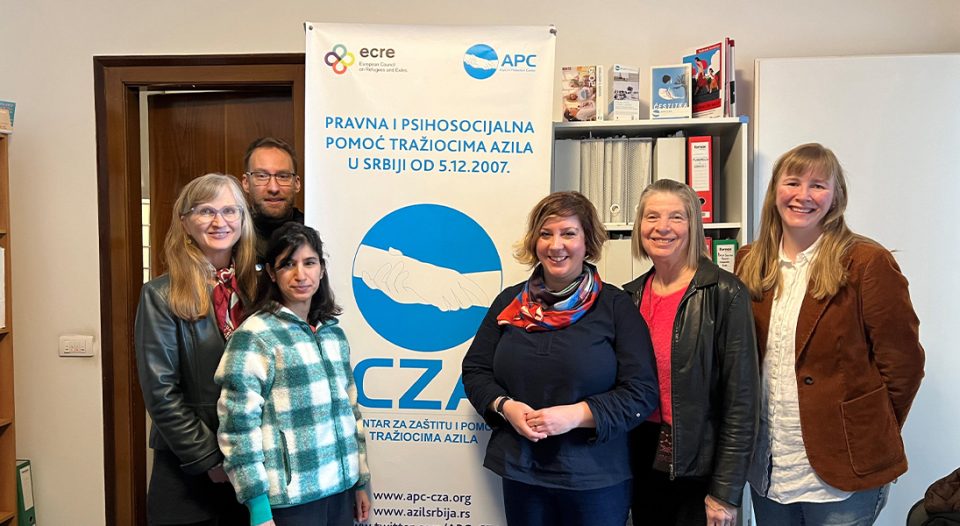Ongoing persecution, conflict, violence, human rights violations, economic shocks and natural disasters, as well as other destabilizing events, all compounded by the COVID-19 pandemic, have greatly increased the number of people worldwide who have been forced to flee their homes.
The ELCA AMMPARO strategy to accompany migrants with protection, advocacy, representation and opportunities was adopted by the ELCA Churchwide Assembly in 2016. That strategy was envisioned to encompass a holistic, whole-church response to the increased migration of Central American minors to the U.S.-Mexico border that began in 2011.
AMMPARO has enabled the ELCA churchwide organization, synods and congregations to work together under one umbrella to welcome all people fleeing violence, poverty and environmental disaster. It has also prompted increased collaboration among the ELCA’s international companions.
Now ELCA AMMPARO is expanding to AMMPARO Global, a strategy designed to respond to humanitarian crises that drive forced migration and displacement in other areas of the world.
“The strategy was passed, developed and became churchwide strategy in 2016 because of what was happening at our own southern border with unaccompanied children,” said Mary Campbell, program director of AMMPARO.
Significant developments, both within the church and in the geopolitical and policy landscape since the strategy’s implementation, have necessitated such an expansion.
“This expansion is an acknowledgment, both domestically and internationally, of where we are.”
“We had congregations and synods who cared about and were doing work around immigration issues before the AMMPARO strategy began,” Campbell said. “Often, they’d say, ‘We’re not doing anything with minors, can we still be part of this?’ ‘The refugees we’re accompanying aren’t from the Americas, they’re from Congo, can we do this?’”
In 2019 the Churchwide Assembly voted for the ELCA to become a sanctuary church body in the United States. While congregational accompaniment of migrants has never been limited to Central American children and families, the sanctuary decision broadened the church’s sense of accompaniment to include vulnerable migrants and immigrants of all nationalities who reach the United States.
“This expansion is an acknowledgment, both domestically and internationally, of where we are,” Campbell said. “As a church we have long been engaged with our partners around the world.”
The AMMPARO strategy’s three original guiding principles were accompaniment, awareness-raising and advocacy, also known as the “three As.” Now, with AMMPARO Global’s expansion in focus, a fourth “A,” articulation, has been added.
This principle of articulation refers to the intentional strategy of fostering the development of functioning networks and strategic alliances between AMMPARO companions located in the same country, among companions in adjacent countries located along the same migrant route, or between companions working with migrants from the same country of origin. Such articulation includes the work already being done by ELCA companions that can now formally join the strategy’s network.
“AMMPARO Global is an acknowledgment of the work that’s been going on around the world, with the additional possibility of strengthening the work through what we have achieved in the Americas through articulation,” Campbell said. “That means that our companions are connected to each other. We have a really solid network that goes from Chile through to the United States.”
Durable solutions
AMMPARO Global will permit a more global focus on durable solutions for migrants who, in many areas of the world, are caught in transition for decades or more. Advocacy for comprehensive immigration reform and full implementation of the United Nations’ Global Compact for Migration already has been enhanced through this effort. AMMPARO Global will include a network of partner ministries and, through this network, accompany migrants from regions of the world outside the Americas both nationally and internationally. The shift will bolster the ELCA’s ministry with and accompaniment of all migrants and refugees, regardless of their country of origin.
Together with Rachel Eskesen, ELCA area desk director for Europe, Campbell and other members of the AMMPARO team recently visited two companion organizations that are new to AMMPARO’s network but longtime partners of the ELCA. One was the Asylum Protection Center (APC/CZA), a Serbian legal assistance organization in Belgrade that the church supports through ELCA World Hunger. Because of Serbia’s location, refugees from many countries may choose to seek asylum there. Those staying in Serbia are able to get legal assistance from APC/CZA to file asylum claims in order to stay in the country.
“APC/CZA are a longstanding regional partner and asylum process experts,” said Eskesen. “Their comprehensive approach includes cultural mentors, economic opportunities, professional training, medical and psychosocial support, and combating xenophobia through trusted media. Already leaders in Serbia and the region, we are glad they are part of the conversation for an AMMPARO Global migration strategy.”
The shift will bolster the ELCA’s ministry with and accompaniment of all migrants and refugees, regardless of their country of origin.
The other location the team visited was in Bihać, in northwest Bosnia and Herzegovina near the Croatian border. It’s a city of around 50,000 long-term residents, though the population has repeatedly temporarily swelled to twice that number because of the people attempting migration to the European Union through Croatia. “Our partner Church World Service coordinates a team of local experts in Bihać to fill in the gaps where the network of organizations is present to support migrants, refugees and asylum-seekers,” said Eskesen.
In coordination with local, state-run social welfare centers where migrants temporarily stay, Church World Service provides a pivotal guardianship role for unaccompanied children, assessing risks and vulnerabilities to connect children with the services they need. The organization also works to ensure that families are kept together in the centers’ family facilities and helps provide transportation to migrants staying at the center.
Experiencing the work of these partners firsthand affirmed for the team the strength of the accompaniment network that already exists, as well as the mutual benefit to AMMPARO and its partners that will come from the strategy’s expansion.
“People call us, even from other churches in the U.S., asking, ‘Is there anything AMMPARO can do to help an asylum-seeker in the U.S. or, in some cases, a specific migrant returned to their country of origin?’” said Campbell. “We can, almost always, connect them to a companion who can accompany them in the Americas—and soon may be able to do so in many places in the world.”





